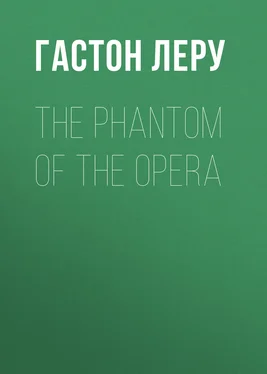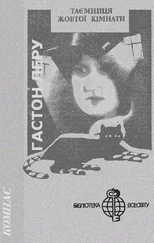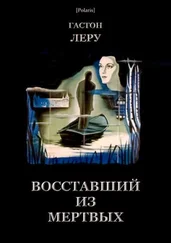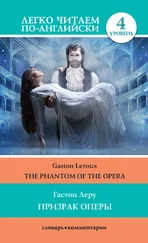Гастон Леру - The Phantom of the Opera
Здесь есть возможность читать онлайн «Гастон Леру - The Phantom of the Opera» — ознакомительный отрывок электронной книги совершенно бесплатно, а после прочтения отрывка купить полную версию. В некоторых случаях можно слушать аудио, скачать через торрент в формате fb2 и присутствует краткое содержание. Жанр: foreign_prose, literature_20, Ужасы и Мистика, foreign_antique, на английском языке. Описание произведения, (предисловие) а так же отзывы посетителей доступны на портале библиотеки ЛибКат.
- Название:The Phantom of the Opera
- Автор:
- Жанр:
- Год:неизвестен
- ISBN:нет данных
- Рейтинг книги:5 / 5. Голосов: 1
-
Избранное:Добавить в избранное
- Отзывы:
-
Ваша оценка:
- 100
- 1
- 2
- 3
- 4
- 5
The Phantom of the Opera: краткое содержание, описание и аннотация
Предлагаем к чтению аннотацию, описание, краткое содержание или предисловие (зависит от того, что написал сам автор книги «The Phantom of the Opera»). Если вы не нашли необходимую информацию о книге — напишите в комментариях, мы постараемся отыскать её.
The Phantom of the Opera — читать онлайн ознакомительный отрывок
Ниже представлен текст книги, разбитый по страницам. Система сохранения места последней прочитанной страницы, позволяет с удобством читать онлайн бесплатно книгу «The Phantom of the Opera», без необходимости каждый раз заново искать на чём Вы остановились. Поставьте закладку, и сможете в любой момент перейти на страницу, на которой закончили чтение.
Интервал:
Закладка:
"When you saw me in your dressing-room, was that the first time you noticed me, Christine?"
She was incapable of lying.
"No," she said, "I had seen you several times in your brother's box. And also on the stage."
"I thought so!" said Raoul, compressing his lips. "But then why, when you saw me in your room, at your feet, reminding you that I had rescued your scarf from the sea, why did you answer as though you did not know me and also why did you laugh?"
The tone of these questions was so rough that Christine stared at Raoul without replying. The young man himself was aghast at the sudden quarrel which he had dared to raise at the very moment when he had resolved to speak words of gentleness, love and submission to Christine. A husband, a lover with all rights, would talk no differently to a wife, a mistress who had offended him. But he had gone too far and saw no other way out of the ridiculous position than to behave odiously.
"You don't answer!" he said angrily and unhappily. "Well, I will answer for you. It was because there was some one in the room who was in your way, Christine, some one that you did not wish to know that you could be interested in any one else!"
"If any one was in my way, my friend," Christine broke in coldly, "if any one was in my way, that evening, it was yourself, since I told you to leave the room!"
"Yes, so that you might remain with the other!"
"What are you saying, monsieur?" asked the girl excitedly. "And to what other do you refer?"
"To the man to whom you said, 'I sing only for you! … to-night I gave you my soul and I am dead!'"
Christine seized Raoul's arm and clutched it with a strength which no one would have suspected in so frail a creature.
"Then you were listening behind the door?"
"Yes, because I love you everything … And I heard everything …"
"You heard what?"
And the young girl, becoming strangely calm, released Raoul's arm.
"He said to you, 'Christine, you must love me!'"
At these words, a deathly pallor spread over Christine's face, dark rings formed round her eyes, she staggered and seemed on the point of swooning. Raoul darted forward, with arms outstretched, but Christine had overcome her passing faintness and said, in a low voice:
"Go on! Go on! Tell me all you heard!"
At an utter loss to understand, Raoul answered: "I heard him reply, when you said you had given him your soul, 'Your soul is a beautiful thing, child, and I thank you. No emperor ever received so fair a gift. The angels wept tonight.'"
Christine carried her hand to her heart, a prey to indescribable emotion. Her eyes stared before her like a madwoman's. Raoul was terror-stricken. But suddenly Christine's eyes moistened and two great tears trickled, like two pearls, down her ivory cheeks.
"Christine!"
"Raoul!"
The young man tried to take her in his arms, but she escaped and fled in great disorder.
While Christine remained locked in her room, Raoul was at his wit's end what to do. He refused to breakfast. He was terribly concerned and bitterly grieved to see the hours, which he had hoped to find so sweet, slip past without the presence of the young Swedish girl. Why did she not come to roam with him through the country where they had so many memories in common? He heard that she had had a mass said, that morning, for the repose of her father's soul and spent a long time praying in the little church and on the fiddler's tomb. Then, as she seemed to have nothing more to do at Perros and, in fact, was doing nothing there, why did she not go back to Paris at once?
Raoul walked away, dejectedly, to the graveyard in which the church stood and was indeed alone among the tombs, reading the inscriptions; but, when he turned behind the apse, he was suddenly struck by the dazzling note of the flowers that straggled over the white ground. They were marvelous red roses that had blossomed in the morning, in the snow, giving a glimpse of life among the dead, for death was all around him. It also, like the flowers, issued from the ground, which had flung back a number of its corpses. Skeletons and skulls by the hundred were heaped against the wall of the church, held in position by a wire that left the whole gruesome stack visible. Dead men's bones, arranged in rows, like bricks, to form the first course upon which the walls of the sacristy had been built. The door of the sacristy opened in the middle of that bony structure, as is often seen in old Breton churches.
Raoul said a prayer for Daae and then, painfully impressed by all those eternal smiles on the mouths of skulls, he climbed the slope and sat down on the edge of the heath overlooking the sea. The wind fell with the evening. Raoul was surrounded by icy darkness, but he did not feel the cold. It was here, he remembered, that he used to come with little Christine to see the Korrigans dance at the rising of the moon. He had never seen any, though his eyes were good, whereas Christine, who was a little shortsighted, pretended that she had seen many. He smiled at the thought and then suddenly gave a start. A voice behind him said:
"Do you think the Korrigans will come this evening?"
It was Christine. He tried to speak. She put her gloved hand on his mouth.
"Listen, Raoul. I have decided to tell you something serious, very serious … Do you remember the legend of the Angel of Music?"
"I do indeed," he said. "I believe it was here that your father first told it to us."
"And it was here that he said, 'When I am in Heaven, my child, I will send him to you.' Well, Raoul, my father is in Heaven, and I have been visited by the Angel of Music."
"I have no doubt of it," replied the young man gravely, for it seemed to him that his friend, in obedience to a pious thought, was connecting the memory of her father with the brilliancy of her last triumph.
Christine appeared astonished at the Vicomte de Chagny's coolness:
"How do you understand it?" she asked, bringing her pale face so close to his that he might have thought that Christine was going to give him a kiss; but she only wanted to read his eyes in spite of the dark.
"I understand," he said, "that no human being can sing as you sang the other evening without the intervention of some miracle. No professor on earth can teach you such accents as those. You have heard the Angel of Music, Christine."
"Yes," she said solemnly, "IN MY DRESSING-ROOM. That is where he comes to give me my lessons daily."
"In your dressing-room?" he echoed stupidly.
"Yes, that is where I have heard him; and I have not been the only one to hear him."
"Who else heard him, Christine?"
"You, my friend."
"I? I heard the Angel of Music?"
"Yes, the other evening, it was he who was talking when you were listening behind the door. It was he who said, 'You must love me.' But I then thought that I was the only one to hear his voice. Imagine my astonishment when you told me, this morning, that you could hear him too."
Raoul burst out laughing. The first rays of the moon came and shrouded the two young people in their light. Christine turned on Raoul with a hostile air. Her eyes, usually so gentle, flashed fire.
"What are you laughing at? YOU think you heard a man's voice, I suppose?"
"Well! …" replied the young man, whose ideas began to grow confused in the face of Christine's determined attitude.
"It's you, Raoul, who say that? You, an old playfellow of my own! A friend of my father's! But you have changed since those days. What are you thinking of? I am an honest girl, M. le Vicomte de Chagny, and I don't lock myself up in my dressing-room with men's voices. If you had opened the door, you would have seen that there was nobody in the room!"
"That's true! I did open the door, when you were gone, and I found no one in the room."
Читать дальшеИнтервал:
Закладка:
Похожие книги на «The Phantom of the Opera»
Представляем Вашему вниманию похожие книги на «The Phantom of the Opera» списком для выбора. Мы отобрали схожую по названию и смыслу литературу в надежде предоставить читателям больше вариантов отыскать новые, интересные, ещё непрочитанные произведения.
Обсуждение, отзывы о книге «The Phantom of the Opera» и просто собственные мнения читателей. Оставьте ваши комментарии, напишите, что Вы думаете о произведении, его смысле или главных героях. Укажите что конкретно понравилось, а что нет, и почему Вы так считаете.












